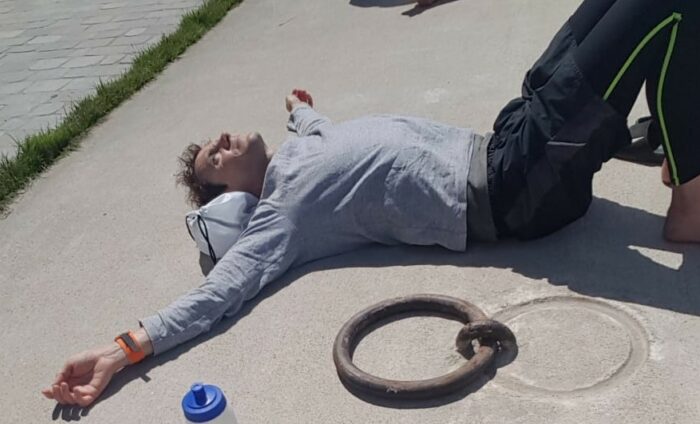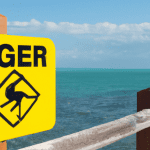
Why swimmers are like boiled frogs
Soaking up the sun before the swim – but it wasn’t enough to keep me warm
There’s a fable that claims if you put a frog in a pot of water and heat it, the frog will eventually be boiled to death as it won’t notice or react to the gradually changing temperature. Yet while we laugh at the stupidity of the frog, we should consider what happens when you put a swimmer in cool water.
Last Saturday I took part in the Open Swim Stars Paris 10km* swim. Both the water and air temperatures were around 21 degrees and the sun was shining, so I decided to swim without a wetsuit. I’ve swum further in cooler water before and therefore didn’t anticipate any problems.
About half way through, I was feeling cold but not, I thought, dangerously so. I grabbed an energy drink from the feed station and carried on swimming, hoping the energy would help me warm up again. It didn’t. By around the 7 or 8km mark I realised I had slowed down, and this was a warning sign that I had got too cold. I considered abandoning the swim but I was also aware that my towel and warm clothes were all at the finish line – and decided it was better to push on to the end.
The last few hundred metres were brutal. I felt like I was swimming through treacle as swimmer after swimmer powered past me, but I made it and hauled myself out of the water, where my friends wrapped me up and bundled me into the medical tent. The recovery was rough and I spent a good 20 to 30 minutes shivering violently and uncontrollably before I started to feel better. The first-aider was initially unable to get a body temperature reading with the ear thermometer, which means it could have dropped to around 33 degrees. Luckily, I remained conscious and coherent throughout unlike one of my previous brushes with hypothermia but it was still an unpleasant and possibly risky state to be in.
There’s a fine line with open water swimming between being uncomfortably cold and dangerously hypothermic. It’s normal for your core body temperature to drop after swimming as cool blood from your extremities circulates through your body. Some mild shivering after you’ve got out and dressed is not usually a problem. But hypothermia is potentially deadly, and I suspect (based on my experience and observations of other people) that swimmers are a bit like those fabled frogs and do not notice or fully appreciate the danger of their bodies cooling down. We’re stubborn buggers and once we set ourselves targets, tend to push ourselves hard to reach them. Sometimes too hard.
The other point to bear in mind is that every swim is different and conditions that would cause you no problems one day might do on another. I certainly didn’t expect to suffer from the cold in Paris (many swimmers consider 21 degrees to be too warm) but looking back there are a few factors that may have made a difference to my ability to tolerate cool water. Firstly, since I’ve been doing a bit of running (for swimrun events) I’ve lost around 4kg. This might not sound like much, but perhaps it’s the vital amount that was helping me keep warmer in cool water. Secondly, I’ve done a lot of racing and travelling already this year, so I’m fatigued. I’d also got up early and flown in to Paris that morning for the swim and hadn’t had much sleep the night before. Thirdly, I haven’t done a lot of cold water swimming over the last six months, so perhaps was not as acclimatised as I could have been.
The frog fable is almost certainly false. Frogs will try to escape from a pot if you heat it, although I’d suggest it would be unethical to test this. However, swimmers will and do keep swimming as they get colder, and we cannot always tell when the conditions have got the better of us. We also don’t like to fail. Two weeks ago in Mallorca I terminated a 10km swim at the 7km mark because I felt cold and sick. I felt like I’d ‘failed’ but, with hindsight, getting out was the right thing to do. Sticking out the full 10km in Paris was probably the swimmer’s equivalent of the boiled frog syndrome.
It’s something to bear in mind both when you’re swimming and when you’re looking after other swimmers in the water.
Swim wild and free, but stay safe.
* I should add that, apart from getting a little cold, I really enjoyed the Paris swim and recommend it. I was there last year for the 5km and returned this year because they added a 10km to the programme. It’s well organised, friendly, easy to get to from London, and there’s something unique about swimming in an urban canal. Plus, you get to visit Paris.








